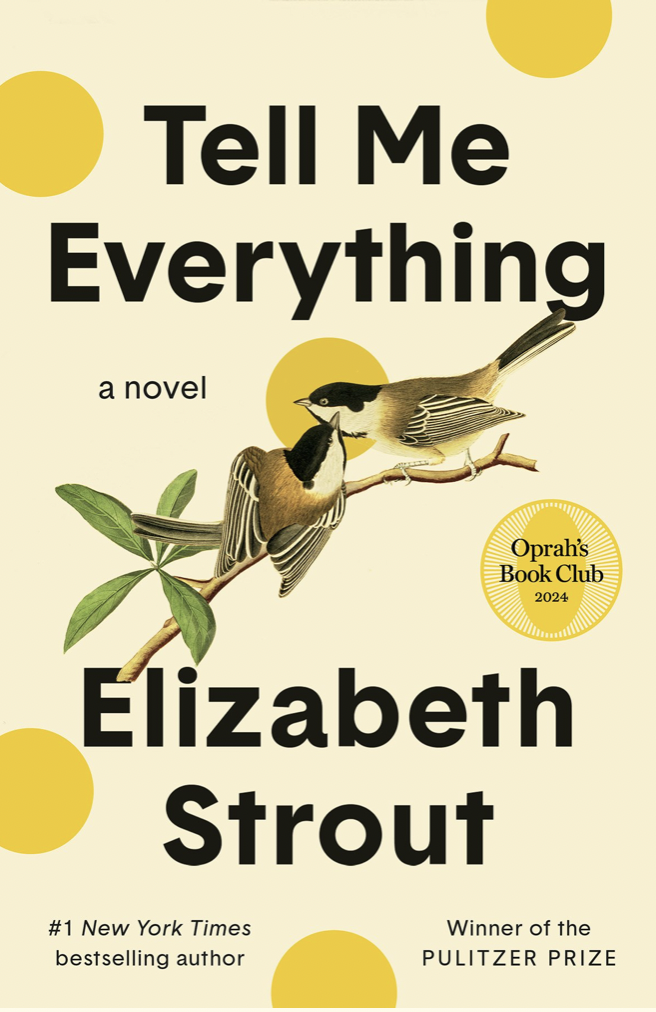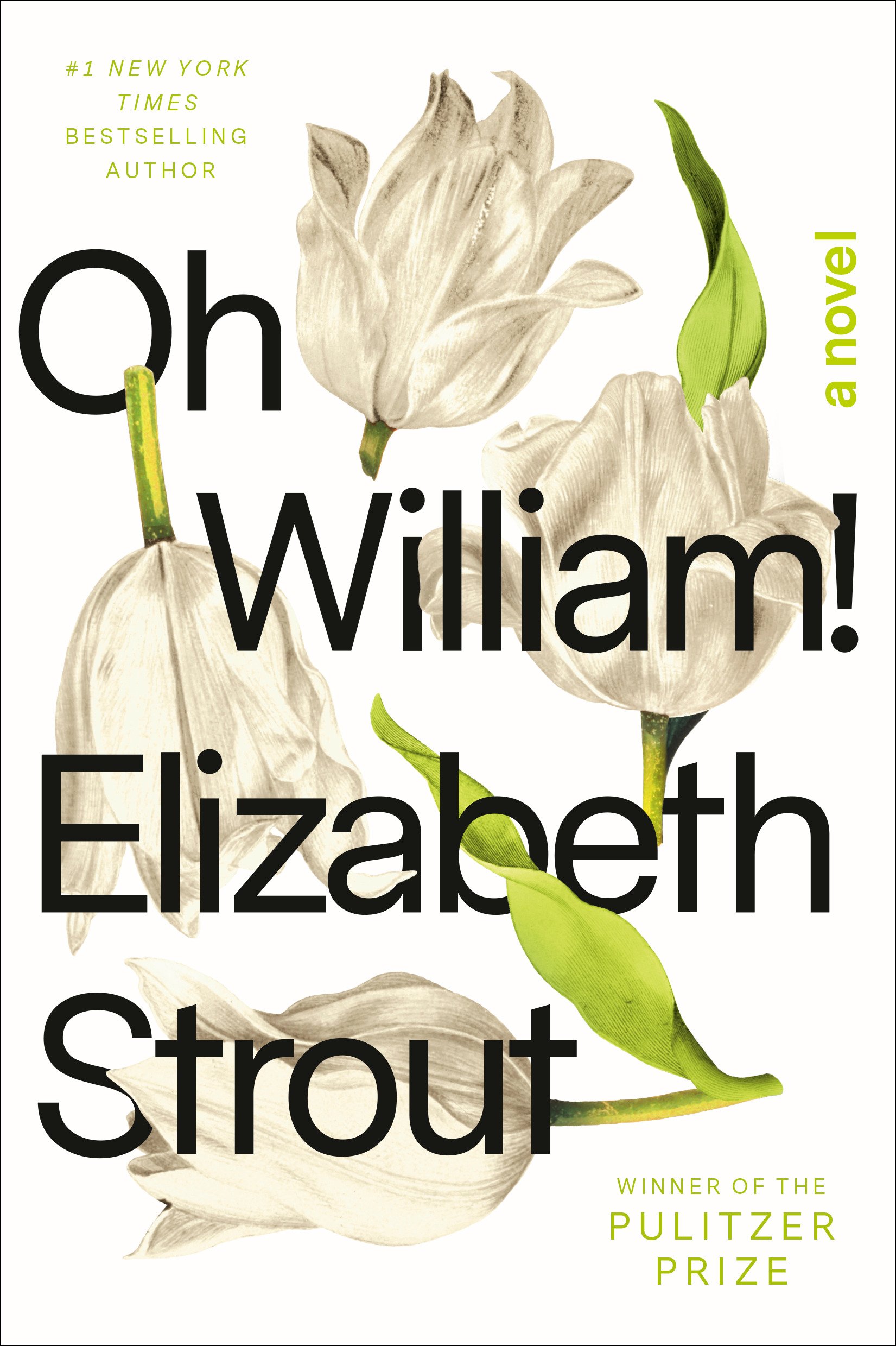
Recent Reviews

Tell Me Everything by Elizabeth Strout
With great insight, Elizabeth Strout’s newest novel probes the complexity of human relationships. How well can we know another person? How well can we know ourselves? She concludes not well: “We are all such mysteries.” But her novel offers an antidote to this isolation. Listening to other people’s stories connects us to them and causes us to empathize with their plight. Exchanging stories is a gift we can give to ourselves and others.
This character-driven novel takes place in the fictional town of Crosby, Maine. We have met the protagonists in Strout’s prior books: Bob Burgess, Lucy Barton, and Olive Kittridge. The plot revolves around their deepening friendships, the stories they share, and the murder of an elderly woman on the outskirts of town.
Strout’s characters are defined by the traumas (often unknown to others) that shaped their journey. Her characters’ ordeals occurred in their childhoods and have been the engine (consciously or unconsciously) driving their lives. Olive Kittredge says, ‘If you don’t think everyone is broken in some way, you’re wrong.” The novel’s characters have endured sexual abuse, suicide, alcoholism, disease, divorce, poverty, and the guilt of accidentally killing a parent.
The novel has a wistful tone as the characters wrestle with themselves and those they encounter. They share their fears and worries, their joys and pleasures, and the stories they hear about other people in town. Just when you are about to judge a character’s cruel action or poor choice, the character’s background is revealed, and you feel compassion instead.
The book can sometimes feel like a quirky collection of short stories. Still, Strout weaves them into an existential narrative about how people overcome their hardships and connect with others. Lucy Barton states, “People just live their lives with no real knowledge of anybody.”
In this world filled with so much suffering, Strout suggests that listening to others without judgment is a gift of love and the only antidote to the existential loneliness of our minds. This novel is poignant, provocative and packed with insights. I highly recommend Tell Me Everything. 5/5

Lucy by the Sea by Elizabeth Strout
I loved the first book I read in 2023: ‘Lucy by the Sea’ by Elizabeth Strout.
The story is about grief and adaptation, both personal and collective, during COVID. Strout is a gifted writer who wrestles with the complex contradictions of being a person. In simple but profound prose, readers can almost embody the emotions felt by Lucy Barton, the novel’s protagonist. The ability of Strout to reveal Lucy’s understanding of her inner life is exceptional.
The story starts in March 2020, when the pandemic began spreading across the United States. Lucy, a successful novelist, lives in a comfortable Manhattan apartment. She is grieving the death of her second husband, David. Her relationship with her ex-husband William is warm, and they share a deep love for their adult daughters.
William arrives unexpectedly at Lucy’s apartment and tells her to pack her bag. His third wife has left him, and he wants Lucy to flee New York. He has rented a small house on the coast of Maine where they can escape the coming plague… as friends. Because William is a scientist, Lucy listens and begins packing. The move from the bustling familiarity of New York to the isolated Maine coast rattles Lucy. “What is strange as I look back is how I simply did not know what was happening.”
Strout captures Lucy’s anxiety, fear, and grief as she absorbs the death of David away from their New York apartment. She also misses her daughters, worries about her siblings, and is haunted by her cruel parents. Lucy and William settle into a routine. Lucy is so disoriented that she sometimes feels like she might fall. “There was a feeling of mutedness. I would be privately staggered by grief. My ears were plugged up as though I was underwater.” Lucy has a massive panic attack.
Though some neighbors resent the arrival of New Yorkers, others (whom we have met in Strout’s prior books) are kind. Watching TV nightly, Lucy and William are distraught by the high COVID death rates that now include friends, George Floyd’s murder, and the election denial of the former president. The world seems fragile as democracy teeters. Most characters wear masks and gloves, sit apart outside and refrain from hugging. But COVID denial rears its ugly head as Lucy’s two siblings resist reality in rural Illinois. Lucy’s sister works as an aide in a nursing home. She tells Lucy, “We don’t wear masks at church Lucy. It’s the government trying to force us to do that.” Lucy tries to understand. “What if I felt looked down upon all the time by the wealthier people in this country, who made fun of my religion and my guns.”
Being isolated in a house by the sea, Lucy and William ponder their lives. Though they can irritate each another, they are older now and can better empathize. William says, “I am in mourning for my life.” And Lucy realizes that the pandemic replicates her youth. “My whole childhood was a lockdown. I never saw anyone or went anywhere.”
Elizabeth Strout offers another insightful novel about one woman’s feelings yet speaks to the larger human struggle around grief, loss, dislocation, and uncertainty. Everyone has an initial COVID memory that includes fear, distress, and disorientation. Because of Strout’s writing gifts, this astute novel helps us make sense of those feelings. The novel ends with hope and even happiness. 4.5/5

Oh William! by Elizabeth Strout
Elizabeth Strout is one of my favorite authors. No doubt, this Pulitzer Prize winner is a talented writer. But what I admire most is her persistent probing into the human psyche. What does it mean to be a person? Can we know ourselves? Can we really know the people we love? Strout’s books quietly invite readers to reflect on the nuances of family relationships. If you haven't read ‘Olive Kittredge’ and ‘The Burgess Boys’, I highly recommend them.
With “Oh William!” Strout explores the dynamics of a marriage. She revisits Lucy Barton, the protagonist of her last two novels. Lucy’s beloved second husband, David, has died, and Lucy has been pondering her life while grieving. Her ex-husband William, the father of her grown daughters, asks Lucy to join him on a road trip to Maine. His second wife has left him, and he wants to investigate a recently uncovered family secret. Romance is not the motivation; William needs Lucy’s company. Throughout their short adventure, Lucy thinks more specifically about her relationship with William and her initial attraction to him. With the passing of time and the help of a therapist, she is aware of just how little she knew about herself and William. Though her marriage lasted twenty years, she thinks, “William had always been a mystery to me. I am only saying: I wondered who William was.” Of course, she knew intimately William’s likes, dislikes, preferences and needs. But Lucy is wondering about something more profound, more complicated about their relationship.
Though Lucy is a successful 63-year-old writer living in New York City, she is still naïve and trapped within her youthful feelings of invisibility. Her voice is passive and distant. She has not psychologically moved beyond her impoverished childhood filled with neglect and disregard. Grateful for her writing career and kindhearted daughters, Lucy still doesn’t believe she deserves happiness. She tolerated William’s bad behavior in their marriage while making poor judgments herself. She reflects, “Who ever really knows the experience of another?”
Driving with William for hours in a car creates an opportunity for Lucy to understand more. Lucy and William query each other about different moments in their marriage and share their perspectives. The discovery of William’s family secret enriches their conversation.
When they return to their separate lives in New York City, Lucy comprehends a bit more about herself and her life with William. Without angst, she states on the final page, “Everybody in this whole wide world, we do not know anybody, not even ourselves! Except a little tiny, tiny bit we do. But we are all mythologies, mysterious. We are all mysteries.”
This short novel is packed with thought-provoking insights about marriage and the complexities of human relationships. Another gem by Elizabeth Strout. 4/5
